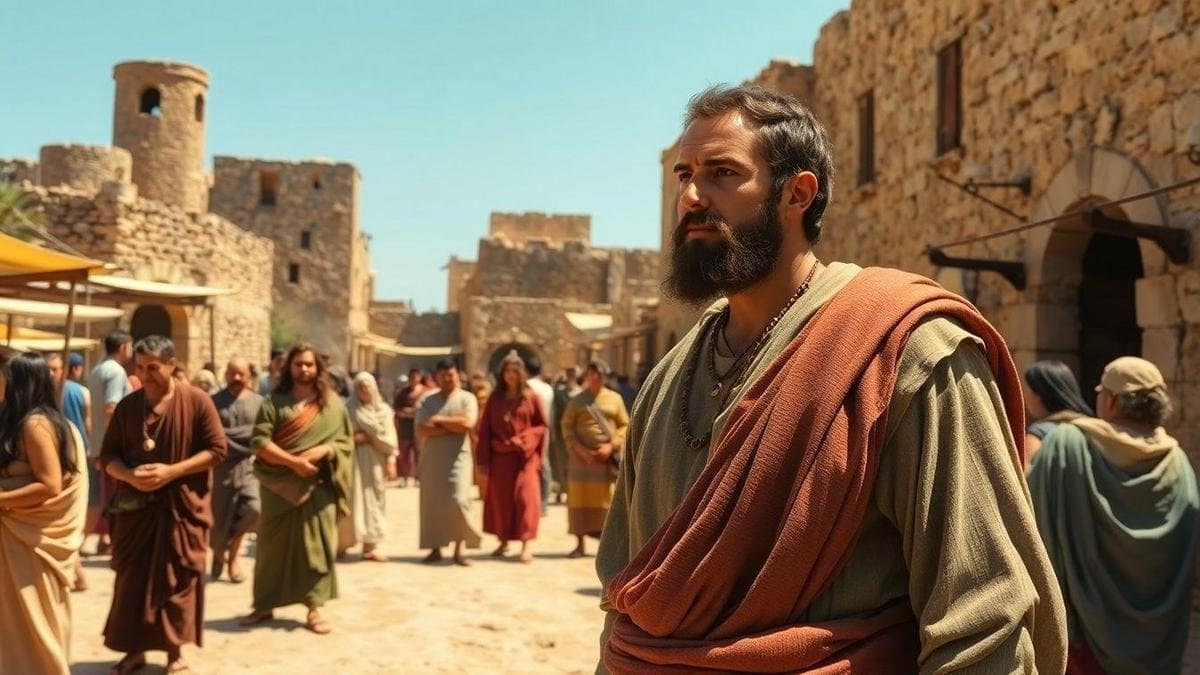Who was Bathsheba in the Bible?
Who was Bathsheba in the Bible? How did Bathsheba, a seemingly modest figure in the pages of the Bible, become a pivotal character in one of its most dramatic narratives?
While her story often takes a backseat to the actions of those around her, understanding Bathsheba’s role offers powerful insights into themes of power, repentance, and destiny.
Her story, intertwined with that of King David, is not just a tale of infidelity, but also a profound narrative about human nature and divine intervention.
Bathsheba: A Brief Introduction
Bathsheba enters the biblical narrative as a beautiful woman, the wife of Uriah the Hittite, a loyal soldier in King David’s army.
Her story appears in the Second Book of Samuel, and her life is transformed following an unexpected encounter with the king.
This chance meeting and its consequences are pivotal in understanding Bathsheba’s influence and legacy.
She is frequently remembered for her role in King David’s grave sin, but Bathsheba’s character extends far beyond this singular event.
Delving into the specifics of her representation in the Bible, her story unfolds to reveal a deeply personal journey marked by complex relationships and significant victories.
The Encounter with King David
The story of Bathsheba in the Bible begins notably one evening when King David, from his rooftop, sees her bathing.
Gripped by her beauty, David summons her to the palace, and despite Bathsheba’s marital status, they engage in a relationship that leads to her becoming pregnant. Recognizing the potential scandal, David attempts to cover up the affair.
When his efforts to bring Uriah home to be with his wife fail, David arranges for Uriah to be placed in the heat of battle where he is killed.
This marks the beginning of a tumultuous period in Bathsheba’s life, marked by grief over her husband’s death and uncertainty over her own future.
| Key Event | David’s Reaction | Result |
|---|---|---|
| David sees Bathsheba | Desire and lust | Summons her to palace |
| Bathsheba’s pregnancy | Panic and deceit | Uriah’s death plot |
| Uriah’s death | Remorse | David marries Bathsheba |
| Nathan’s Parable | Realization and repentance | Child’s death |
Prophet Nathan’s Reproach
Following these events, God sends the prophet Nathan to confront David. Nathan uses a parable to illustrate David’s wrongdoing, highlighting his abuse of power and moral failing.
Through this confrontation, David recognizes his sin, and Nathan prophesizes that the child born to David and Bathsheba will die as a consequence.
Although filled with regret, David repents, setting an example of personal reflection and atonement.
Bathsheba, while enduring profound loss with the death of her husband and then her child, becomes the embodiment of strength in the face of adversity.
“Then David said to Nathan, ‘I have sinned against the Lord.’ Nathan replied, ‘The Lord has taken away your sin. You are not going to die.'” – 2 Samuel 12:13
Bathsheba’s Role in the Kingdom
Bathsheba’s position shifts when she becomes a queen and the mother of the future king. After the loss of her first child, Bathsheba bears Solomon, who is loved by God and chosen to succeed David as king.
This underscores Bathsheba’s enduring significance within the biblical narrative. Her role transitions from being a passive figure caught in unfortunate circumstances to an influential queen mother.
The Bible notes her involvement in political maneuvers, particularly in ensuring that Solomon ascends to the throne, demonstrating her cunning and determination.
The Legacy of Solomon
Solomon’s reign becomes a golden period in biblical history, marked by wisdom, prosperity, and peace. Bathsheba’s influence on Solomon is evident, as she advises and guides him.
Her legacy, therefore, extends beyond her personal experiences to include her impact on Israel’s development.
Solomon’s successful rule reflects her capability to navigate the complexities of power and politics, solidifying Bathsheba’s place in biblical history as a matriarch who ensured the fulfillment of divine promises.

Bathsheba in Religious Tradition
In religious texts and traditions, Bathsheba is often remembered for her beauty and her relationship with David, but she is also an important figure in the genealogy of Jesus Christ as recorded in the Gospel of Matthew.
Her story is a testament to redemption and God’s ability to bring good out of human error. Throughout various interpretations, Bathsheba remains a symbol of resilience, illustrating how one can rise from personal tribulations to become a figure of significance and virtue.
Examining Bathsheba’s Character
Understanding Bathsheba’s character involves exploring the nuances of her narrative. She is portrayed as a woman of grace, depth, and resilience, who navigates a patriarchal world with wisdom and strength.
Her ability to rise above the personal and political challenges she faces marks her as one of the Bible’s more complex and complete female figures.
In analyzing her story, one can glean insights into handling turmoil with dignity and the importance of resilience in the face of adversity.
- Bathsheba navigates her life with dignity despite personal and public challenges.
- She fosters alliances and influences key political decisions in Israel.
- Bathsheba remains integral to the fulfillment of divine promises through her son, Solomon.
- Her enduring legacy as a wise and prudent matron is underscored by her direct involvement in Solomon’s ascendancy.
Portrayal and Influence across Cultures
Bathsheba’s story has inspired countless retellings and artistic depictions across cultures, reflecting varying interpretations of her actions and influence.
In literature and art, she is often depicted as an embodiment of beauty and temptation, as well as a symbol of motherhood and power.
These portrayals serve as a reminder of the enduring complexity and richness of her story, allowing audiences to engage with her narrative from diverse perspectives and cultural contexts.
The Symbolism of Bathsheba’s Story
Bathsheba’s story is rich in symbolism, reflecting broader themes of sin, repentance, and redemption. Her life underscores the consequences of sin and the potential for forgiveness and restoration.
Additionally, her role in fulfilling God’s plan for Israel highlights the interplay of divine intervention and human agency. Through Bathsheba, the Bible showcases the possibility of redemption and the power of perseverance.
Conclusion
Bathsheba’s story, though initially overshadowed by surrounding events and characters, emerges as a significant narrative within biblical history.
Her journey from a seemingly passive figure to one of influence and authority exemplifies resilience and adaptability in the face of adversity.
Bathsheba’s legacy endures not only through her son Solomon’s prosperous reign but also as a testament to the complexities of human nature and the potential for divine redemption.
Her life offers rich lessons in strength, repentance, and the enduring influence of women in shaping history.
FAQ
What was Bathsheba’s initial role in King David’s life?
Batsheba initially entered King David’s life as the wife of Uriah. David’s attraction to her led to their affair and significant events thereafter.
How did Bathsheba become a queen?
Following Uriah’s death and the subsequent marriage to David, Bathsheba was positioned in the royal family, eventually becoming the mother of Solomon, the future king.
What role did Bathsheba play in Solomon’s rise to power?
Batsheba was instrumental in ensuring Solomon’s ascent to the throne, leveraging her influence and position within the royal court.
How is Bathsheba remembered in religious traditions?
Bathsheba is remembered as a figure who endured personal tragedies and played a vital role in biblical narratives, culminating in the prominence of her son Solomon.
What is the significance of Nathan’s confrontation with David?
Nathan’s confrontation is crucial as it highlights David’s sins, leading to his repentance and showcasing the themes of accountability and forgiveness.







